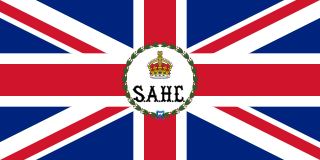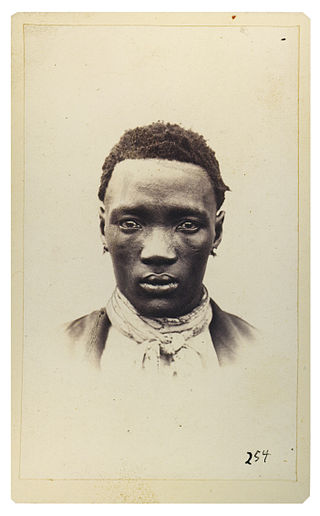The Batswana, a term also used to denote all citizens of Botswana, refers to the country's major ethnic group. Prior to European contact, the Batswana lived as herders and farmers under tribal rule.

Mahikeng, formerly known as Mafikeng and alternatively known as Mafeking, is the capital city of the North West province of South Africa.

Sir Seretse Goitsebeng Maphiri Khama, GCB, KBE was a Botswanan politician who served as the first President of Botswana, a post he held from 1966 to his death in 1980.

The national flag of Botswana consists of a sky blue field cut horizontally in the centre by a black stripe with a thin white frame. Adopted in 1966 to replace the Union Jack, it has been the flag of the Republic of Botswana since the country gained independence that year. It is one of the few African flags that utilises neither the colours of the Pan-Africanist movement nor the colours of the country's leading political party.

The Bechuanaland Protectorate was a protectorate established on 31 March 1885 in Southern Africa by the United Kingdom. It became the Republic of Botswana on 30 September 1966.

British Bechuanaland was a short-lived Crown colony of the United Kingdom that existed in southern Africa from its formation on 30 September 1885 until its annexation to the neighbouring Cape Colony on 16 November 1895. British Bechuanaland had an area of 51,424 square miles (133,190 km2) and a population of 84,210. Today the region forms part of South Africa.
This is a survey of the postage stamps and postal history of Bechuanaland Protectorate.

Elections in Botswana take place within the framework of a multi-party democracy and a parliamentary system. The National Assembly is mostly directly elected, and in turn elects the President and some of its own members. The Ntlo ya Dikgosi is a mixture of appointed, hereditary and indirectly elected members.

The Southern African Customs Union (SACU) is a customs union among five countries of Southern Africa: Botswana, Eswatini, Lesotho, Namibia and South Africa. Its headquarters are in the Namibian capital, Windhoek. It was established in 1910.

The Botswana People's Party (BPP), originally the Bechuanaland People's Party, is a political party in Botswana formed in December 1960 during the colonial era. As a result of disappointment with the Legislative Council, under the leadership of Kgalemang T. Motsete, an accomplished music composer and educationist, BPP became the first mass party to agitate for full independence.
The Botswana Premier League is the highest level football league in Botswana. Organised by the Botswana Football Association, the league was formed in 1978 to replace the pre-independence Bechuanaland Union African Soccer League, which was regional. Participants in the first edition of the league included Tlokweng Pirates, Notwane, Black Peril, Queens Park Rangers and a team from Ngwaketse district.

The British office of high commissioner for Southern Africa was responsible for governing British possessions in Southern Africa, latterly the protectorates of Basutoland, the Bechuanaland Protectorate and Swaziland, as well as for relations with autonomous governments in the area.
Trade unions in Botswana operate within a longstanding democratic system in which the government of Botswana has ratified the International Labour Organization's core conventions, including Conventions 87 and 98.

This is a survey of the postage stamps and postal history of Zimbabwe.
During the late 19th century and early 20th century, a number of South African and British political leaders advocated for a Greater South Africa. This irredentism can be regarded as an early form of Pan-Africanism, albeit strictly limited to White Africans of European ancestry.

The Botswana Police Service is the police service of Botswana and it is a part of Ministry of Defence, Justice and Security. The force has 9,500 police officers.

Sebele I was a chief (kgosi) of the Kwena —a major Tswana tribe (morafe) in modern-day Botswana— who ruled from 1892 until his death in 1911. During his lifetime, he resisted the 1885 Bechuanaland Protectorate as well as the control of his domains by Cecil Rhodes' British South African Company, which was administering, by a royal charter signed in October 1889, his homeland in the Bechuanaland Protectorate and other regions of Central Africa.
John Mackenzie was a Scottish Christian missionary who worked in Southern Africa, and who argued for the rights of the native Africans.
The History of Botswana includes its pre-state history, its colonial period as the Bechuanaland Protectorate, and its modern history as a sovereign state.









